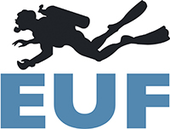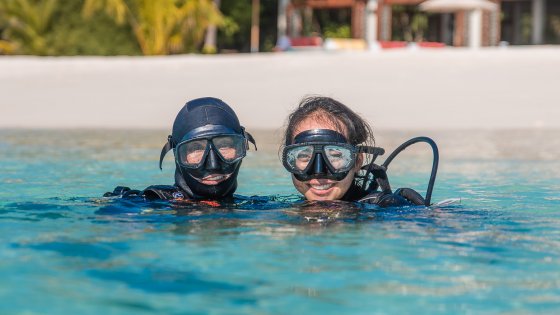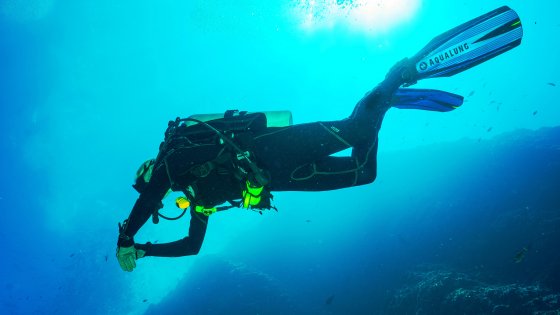EUF Certification
European and International Standards define the state of the art for safety and quality of scuba diving training organisations and dive centers.
EUF Certification International provides them the opportunity to prove their competence and quality of service and confirms as an independent body, that a service has been tested and that its quality is subject to proper control mechanisms.
A co-operation between the European Underwater Federation (EUF) and Austrian Standards.
 The European Underwater Federation was first formed in 1989 by a number of non profit distributing European diver federations and subsequently expanded to include the major profit distributing training agencies. It thus acts as a platform to represent and protect the interests of European recreational diver at the EU level. EUF has supported the development of such standards by the CEN working group. EUF is the European platform for the recreational diving community and is a non-profit company limited by guarantee and registered in the UK.
The European Underwater Federation was first formed in 1989 by a number of non profit distributing European diver federations and subsequently expanded to include the major profit distributing training agencies. It thus acts as a platform to represent and protect the interests of European recreational diver at the EU level. EUF has supported the development of such standards by the CEN working group. EUF is the European platform for the recreational diving community and is a non-profit company limited by guarantee and registered in the UK.
TRAINING ORGANISATIONS/SYSTEM
HOW CERTIFICATION WORKS
All entities providing recreational scuba diving training systems and certification and which assume responsibility for the implementation and quality management of scuba diver and scuba instructor training can apply for certification. The standards provide the opportunity for certification of scuba divers as well as for scuba diving instructors.
On submission of the application for certification, the training organisation must provide specified information and documentation (e.g. training standards, training material for students). These are checked as to whether they meet the requirements of the applicable standards and justify the performance of on-site audits.
Assessments within the framework of the certification procedures are carried out by an audit team. This audit team is composed of a Lead Auditor who is appointed by Austrian Standards and a Technical Auditor who is a professional from the diving training industry.
In order to validate the practical aspects of the training system, on-site audits are performed by the observation of a number of scuba diver and scuba instructor training events at appropriate levels. The number of training events to be audited is determined from the number of certifications issued per year.
EUF Certification International assesses on the basis of the audit report as to whether the training organisation has met all requirements in accordance with the European/International Standards. The certificate will be valid for a maximum of 5 years.
Relevant Standards
EN 14153/ISO 24801
The European Standard EN 14153 / International Standard ISO 24801 consists of the following parts:
- EN 14153-1 / ISO 24801-1 Recreational diving services - Safety related minimum requirements for the training of recreational scuba divers - Part 1: Level 1 "Supervised Diver"
- EN 14153-2 / ISO 24801-2 Recreational diving services - Safety related minimum requirements for the training of recreational scuba divers - Part 2: Level 2 "Autonomous Diver"
- EN 14153-3 / ISO 24801-3 Recreational diving services - Safety related minimum requirements for the training of recreational scuba divers - Part 3: Level 3 "Dive Leader"
Competencies and qualifications of recreational scuba divers of the different levels:
Recreational scuba divers level 1-3
Competencies of a recreational scuba diver at level 1 "Supervised Diver"
A scuba diver at level 1 "Supervised Diver" shall be trained to have sufficient knowledge, skill and experience to dive in open water under the direct supervision of a dive leader.
Scuba divers at level 1 "Supervised Diver" are qualified to dive within the following parameters accompanied by a dive leader:
- dive to a recommended maximum depth of 12 m under the direct supervision of a dive leader,
- dive in groups of up to four level 1 scuba divers per dive leader provided the dive leader is capable of establishing physical contact with all level 1 scuba divers at any point during the dive,
- make dives which do not require in-water decompression stops,
- dive only when appropriate support is available at the surface,
- dive under conditions that are equal or better than the conditions where they were trained.
If accompanied by a scuba instructor, a scuba diver at level 1 may gain progressive experience beyond these parameters and develop competency in managing more challenging diving conditions designed to lead to higher qualifications.
Competencies of a recreational scuba diver at level 2 "Autonomous Diver"
A scuba diver at level 2 "Autonomous Diver" shall be trained to have sufficient knowledge, skill and experience to dive with other scuba divers of at least the same level in open water without supervision of a scuba instructor.
Scuba divers at level 2 "Autonomous Diver" are qualified to dive within the following parameters unless they have additional training or are accompanied by a dive leader:
- dive to a recommended maximum depth of 20 m with other scuba divers of the same level,
- make dives, which do not require in-water decompression stops,
- dive only when appropriate support is available at the surface,
- dive under conditions that are equal or better than the conditions where they were trained.
If diving conditions are significantly different from those previously experienced, a scuba diver at level 2 "Autonomous Diver" requires an appropriate orientation from a dive leader.
If accompanied by a scuba instructor, a scuba diver at level 2 "Autonomous Diver" may gain progressive experience beyond these parameters and develop competency in managing more challenging diving conditions (e.g. increased depth and current, reduced visibility, extreme temperatures) designed to lead to higher qualifications.
Competencies of a recreational scuba diver at level 3 "Dive Leader"
Scuba divers at level 3 "Dive Leader" shall be trained to have sufficient knowledge, skill and experience to plan, organise and conduct their dives and lead other recreational scuba divers in open water.
Scuba divers at level 3 "Dive Leader" are qualified to:
- conduct any specialised recreational scuba diving activities for which they have received appropriate training,
- plan and execute emergency procedures appropriate for the diving environment and activities.
If diving and environmental conditions are significantly different from those previously experienced, a scuba diver at level 3 "Dive Leader" requires an appropriate orientation with regard to local environmental conditions.
In order to lead scuba divers on dives which have more demanding operational parameters a scuba diver at level 3 "Dive Leader" shall have appropriate specialised training and experience.
EN 14413/ISO 24802
The European Standard EN 14413 / International Standard ISO 24802 consists of the following parts:
- EN 14413-1 / ISO 24802-1 Recreational Diving Services - Safety related minimum requirements for the training of scuba instructors - Part 1: Level 1
- EN 14413-2 / ISO 24802-2 Recreational Diving Services - Safety related minimum requirements for the training of scuba instructors - Part 2: Level 2
- ISO 11107 Recreational diving services - Requirements for training programmes on enriched air nitrox (EAN) diving
- ISO 11121 Recreational diving services - Requirements for introductory training program-mes to scuba diving
Competencies and qualifications of recreational scuba instructors of the different levels:
Scuba Instructors
Competencies of a scuba instructor at level 1
A level 1 scuba instructor shall be trained to be qualified to:
- teach and assess scuba students up to level 1 on their theoretical knowledge
- and teach and assess scuba students up to level 1 in confined water.
If supervised and authorised by a scuba instructor level 2:
- gain progressive experience in teaching and assessing the theoretical knowledge of scuba diver levels 2 to 3,
- teach any level of scuba diver in confined water,
- gain progressive experience in teaching and assessing open water surface skills.
If supervised and directly observed by a scuba instructor level 2:
- gain progressive experience in teaching and evaluating in confined and open water.
Competencies of a scuba instructor at level 2
A level 2 scuba instructor shall be trained to be qualified to:
- plan, organise and conduct dives and lead other recreational scuba divers of all levels in open water, including rescue activities,
- teach and assess students up to scuba diver level 1, level 2 and level 3,
- supervise level 1 scuba instructors,
- plan, organise and conduct scuba diver training courses, with suitable additional training or experience to plan,
- organise and conduct appropriate speciality or diving operational activities.
The training programme specified in this International Standards shall ensure that scuba divers are qualified to
- plan, conduct and log EAN open-water, no-decompression dives, when accompanied by another scuba diver of at least level 2 "Autonomous Diver", in accordance with ISO 24801-2;
- procure EAN mixes, EAN equipment and other services to engage in recreational EAN diving without supervision.
The training programme does not qualify divers to make dives which require mandatory in-water decompression stops or dives using more than one breathing gas and/or rebreathers.
A Nitrox training programme in accordance with this standard may be conducted in conjunction with scuba diver training in accordance with ISO 24801-2, but the certification shall not be issued until such time as the student has finalized all certification requirements in accordance with ISO 24801-2.
This International Standard specifies minimum programme content requirements for introductory scuba experiences in recreational scuba diving and applies to program-mes that include participants being taken into an open water environment.
It does not apply to programmes that are exclusively conducted in a confined water environment (e.g. swimming pools). Under no conditions are these requirements considered to be a standard for the training and certification of scuba divers.
Instead, these requirements are used to introduce a non-diver to recreational scuba diving by means of a supervised, controlled dive experience, and to encourage the participant to seek further training.
The introductory diving programme does not result in certification, but is experiential in nature; consequently, in-depth knowledge of diving academics and skills is not necessary. Participants are taught only what is required of them to experience scuba diving under direct supervision.
DIVE CENTERS
Prior to the audit, the applicant shall submit written documentation (e.g. legal form and organizational structure of the service, description of all offered services, list of diving personnel) regarding the services to be certified. The documentation shall be checked and evaluated by the Lead Auditor prior to the audit. A positive evaluation of the documentation is a prerequisite for the conduction of the on-site audit(s).
All assessments in the framework of the specified certification procedures shall be carried out by at least a Lead Auditor. The Lead Auditor is appointed by Austrian Standards. The Lead Auditor may be accompanied by a Technical Auditor with experience in the field of recreational diving service provision.
In order to validate conformity of the services offered, evidential audit(s) shall be performed where access to the diver training records can be provided and where the observation of scuba diver training events, guided and/or organised dives is possible. The audits consist of a theoretical and a practical part.
The result of the audit is assessed by EUF Certification International. The positive assessment of the audit is the prerequisite for the issue of the certificate. The certificate will be valid for a maximum of 6 years if intermediate audits are carried out at least every 2 years.
Relevant Standard
EN 14467 / ISO 24803
The standard EN 14467 / ISO 24803 specifies performance requirements for the service provider, commonly known as the "Dive Center".
A service provider can offer scuba diver training and education, guided dives and rental of diving equipment, and can offer courses leading to one or more of the scuba diver or scuba instructor qualifications specified in.
This International Standard specifies requirements for each of these services separately. Thus, although a client might be provided with two services at the same time, for example diver training and rental of diving equipment, the client is considered to be in receipt of two distinct services.
Service providers may often supply compressed breathing gases. This service is not covered in this International Standard as it is usually covered by national legislation.
This International Standard for service providers has a key role in this series of standards for recreational diving services as it specifies requirements that are common to the provision of training and certification of scuba divers and scuba instructors as specified in the other standards in the series.



